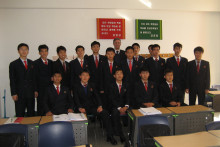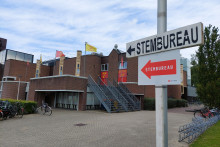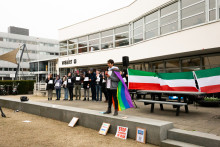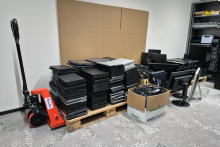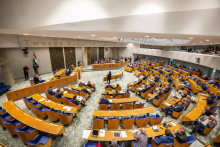‘During my time at ITC I have visited several 'special' countries, such as Libya when that country was still a strong part of the 'axis of evil'. I saw that each country had friendly, inquisitive and capable people who would love to develop themselves, even if we don't agree with local policy and ideologies.’
‘In the spring a Dutch friend told me that the Pyongyang University of Science and Technology (PUST) was looking for a teacher in ecology. Even though that isn't quite my subject as a geologist, I thought there was enough common ground, such as environmental geology. I decided to submit my CV and design a programme, knowing that I had accrued enough sabbatical days.’
‘It became clear that I was welcome. A visa wasn't a problem, that would be arranged by the university in Pyongyang. I only had to submit a list of which electronic devices and storage media I had with me, and which books. In addition to my ecology books for the course I had brought some personal books of which I was sure they wouldn't be tolerated in North Korea. However, as some people who had also been there had said: as long as you keep your personal reading material to yourself there's no problem.’
André Rieu in military setting
‘Of course, there are limitations for foreigners in North Korea. I lived in a guest house on the campus and wasn't allowed to leave the campus without supervision. Three times a week a shopping trip was organized to 'western' stores, on the embassy terrain for example, where the foreign goodies like peanut butter, cheese, milk and yoghurt could be bought. Here you could pay in euros, dollars or Chinese Yuan. The conversion of money is a little difficult: 10.000 Won is about 1 euro. Bank notes varied from a maximum of 5000 Won (50 euro cents) to 50 Won (a half euro cent). In the shops you were given a jumble of coins in change, sometimes supplemented by candy to make it exact.’
The streetview in Pyongyang
‘The most interesting was the Thongil market, where huge groups of locals buy and sell fresh food, clothing and hardware. The relatively simple way of life of the North Koreans makes you think about our western standards.’
‘Other excursions were organized in addition to the shopping trips: weekly swimming trips, visiting a restaurant with a group on request, and from time to time a trip to tourist destinations. I sadly missed a trip to Kaesŏng, the old capital of Korea, and the demilitarized zone between North and South Korea. I was limited to trips in and around Pyongyang, so I don't know what the rest of the country looks like, apart from the landscape that I could see from the plane.’
‘Pyongyang surprised me because of the relatively high number of new cars and cabs, right next to the old trams and trolley buses from the fifties, and the inevitable uniforms that you see everywhere. Large TV screens in the city showed the equally inevitable strictly directed TV programmes. North Koreans are very musical people. The official modern band - consisting of only women - reminded me the most of André Rieu, though in a military setting.’
Idealistic 'miracle'
‘The PUST is a private university, something you wouldn't expect in North Korea. In a way this could be considered some sort of miracle. The university is 'driven' by idealism, by people who believe that confrontation cannot lead to the reunification of North and South Korea. That is why it is not surprising that the visiting staff for a large part consists of ethnic Koreans from, for instance, Canada, the United States, New Zealand and of course South Korea.’
‘The students are very inquisitive and pick up information quickly. At the end of the course, which lasted 5 weeks for a total of 54 hours, they processed and summarized an up-to-date report on ecology. In addition they reflected on their own understanding of the teaching material and formulated an idea for a follow-up study. It's correct that they're used to a very traditional education, but the English-language teachers that supervise them for the entire first year of study do a good job, both in the area of language and in creating an academic attitude.’

On the left, the main building. To the right the accommodations.
‘UT is a bureaucratic heaven’
‘Aside from the lessons I sometimes saw the students during meals or during sport activities (football, table tennis). However, we weren't allowed to have personal conversations for too long. There were free meals in the canteen, but they were really simple: three times a day rice and 'kimchi', fermented Korean cabbage, with little variation. After I'd finished my Dutch cheese I had to quickly go on a shopping trip in order to arrange my own breakfast.’
‘I had to hand over all my learning resources to North Korean counterparts beforehand. This is the standard and only very rarely is something rejected. From time to time there were some last-minute changes and a lack of communication. We're used to that at the UT as well, but believe me, if you've been to North Korea for a few weeks you come back with the idea that the UT is a bureaucratic heaven.’
‘In addition to my course on ecology I had been invited to speak on quality assurance in education. I was surprised by the large amount of people in the hall, especially the number of North Koreans. Sadly, during my presentation we suffered one of the frequently occurring power outages, though a presentation without Powerpoint can be somewhat more direct.’
PUST-students doing exercises before lunch
A sliver of hope
‘The day before I left was a big day for PUST. The first class of students (classes didn't start until 2010) received their master's diploma. The fact that PUST is recognized by the international community as one of the few slivers of hope in a very difficult diplomatic field was made clear by the presence of delegations of over ten embassies. It was a grand ceremony, with speeches about the fantastic achievements, and a lot of laughter!’

A group picture of the graduation ceremony with ambassadors


